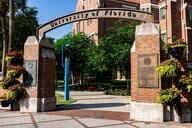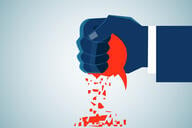You have /5 articles left.
Sign up for a free account or log in.
In business, success is measured in dollars. The person who makes the most sales or the CEO with the biggest salary is the top dog. In sports, success is often measured in personal statistics or championships.
In academe, we measure success via publications and awards. But it doesn’t stop there. We not only count publications in terms of their frequency, but we also weigh them according to a journal’s prestige. Each field has an informal list of what are considered the top journals, and, in addition, we use metrics such as the impact factor, or IF, to measure how many citations papers published in the journals receive. Every year, various outlets release new rankings, and scholars scramble to see how their favorite journals fare.
It gets more complex. We academics rank ourselves as well as our research. Regularly, we see publications that analyze, say, the most-cited criminologists according to where and when they publish, their specific field, sex and even where they work.
All of this is well and good and actually useful for scholars trying to wade through the hundreds of outlets for work that is relevant to our own. We simply do not have time to read everything, so it’s helpful to start at places where the work may be more rigorous. It’s also useful to know who may be someone it would be wise to network with at the next conference.
However, academe is a place that is rife with anxieties, and such ranking and within-group comparison can lead to unnecessary misery. Worse, this kind of assessment has no natural limit. How many publications are enough? How much grant money? What if I am a highly ranked scholar one year but not the next?
This produces something akin to academic anomie. Anomie, the term attributed to the classical sociologist Emile Durkheim, means normlessness, or a state where the expectations of behavior are unclear. For Durkheim, a society characterized by anomie leads to misguided, dissatisfied people and many social ills.
Academic anomie, produced by endless ranking and feelings of relative deprivation, adds to the anxiety academics already feel from a job that seems naturally to attract it. That’s too bad because academe really is a “wonderful life,” as Frank Cullen reminds us. Academic anomie also leads to poor practices that are unhealthy for individuals and their fields -- such as trying to publish quickly, taking shortcuts, not spending the necessary time being a good teacher and adviser, and so forth.
But, in fact, such anomie is unnecessary. Nothing in our job descriptions requires us to be the best ever with the most publications in the best journals with the most grant money.
Instead, we typically are evaluated on the quality of our work, both in the classroom and in the research world. The beauty of this approach is that it’s not a zero-sum game: your quality work does not take away from mine or my ability to produce it. Quality work is also a clear-cut standard but also ambiguous enough to prevent easy ranking and comparison.
Still, it’s clear that ranking and comparisons are not going to go away anytime soon, not in a field where ego plays so prominently. I am as guilty of bowing to ego as anyone. But as someone with a considerable amount of anxiety (diagnosed professionally), I have learned, and am still learning, to reconsider the value of rankings and anomie-inducing guidelines. They can be of interest, perhaps for informational purposes, but they should not be used to assess self-worth. That is a hard lesson for a group of folks used to being or trying to be the best at what they do.
Last year, a tweet from Seretha Williams (@DrSerethaW) noted a sign hanging in her office with the title “World’s Most Okayest Professor.” Williams argued that it is hard work to even get to the level of “OK” professor and that is a perfectly reasonable goal.
That resonated with me for a multitude of reasons. We are already in a fantastic profession that is at a higher status than many of us ever dreamed possible. Instead of appreciating that and working to improve ourselves for the sake of quality, we tend to get sidetracked with external evaluations (understandable, again, given that these are how we achieve promotion).
But in the interest of our own sanities and mental health -- as well as the health of our respective fields -- it would behoove us to consider quality rather than quantity or rankings in whatever we do. After all, most of us got into academe to make a difference, to do meaningful work. Internal comparisons and ranking are a poor way to distinguish what matters from what may make us temporarily feel good.
How do we know whether our work matters? I’ll suggest several ways.
First, citations are a useful metric that our research is being read, but citations typically are confined to peer-reviewed journals -- meaning they are measuring how many academics are reading and engaging with our work. It seems fair to say most of us want to influence more than just the literature review sections of others’ manuscripts. One way to do that is to write about our scholarship for general audiences in local newspapers, publications like Inside Higher Ed and other media outlets. The public often wants to know what it is we are doing and why it matters.
In other words, when you do work that you think matters, tell people about it. Talk to the media, give interviews, explain why what you did is important -- not just for other academics but also for people in your communities and for organizations working on the issues on which your research is focused.
Second, it can be very helpful to partner with groups and organizations who have their “boots on the ground.” Most of us research “real issues” that organizations are trying to address, and those organizations can be open to partnering with scholars on mutually beneficial research. And seeing our work have an immediate impact is immensely rewarding. I have gotten a lot out of partnering with my state Department of Corrections, which welcomes research collaborations as well as student tutoring programs.
Third, working with students on research can allow us to do meaningful work while also engaging in education of future scholars. I work at an undergraduate institution, but even here students must write empirical theses and be actively involved in other research that can be turned into publications. Such collaborations are enriching not only for us as faculty members but also for the students, who gain invaluable experience.
There is no getting away from rankings and comparisons in academe; they come with the territory. In addition, they have their place and can be useful. But they can also be a distraction from how our work matters in a broader context. And they may produce an endless cycle of pursuing metrics that have no natural limit.
We can measure success in other ways that do not induce anomie. Ultimately, it is essential to find meaning in our work internally, rather than externally.




